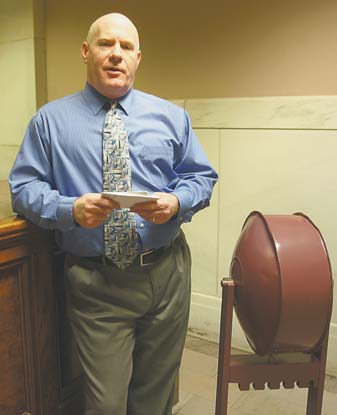Officials: Jury duty validates citizenship

Krichbaum

Robert G. Jackson, jury commissioner of Mahoning County Common Pleas Court, holds attendance cards for current jurors. Next to him is the spinning drum used to select jurors for trial panels before the process was computerized about 10 years ago.
YOUNGSTOWN
Jury service is one of the highest callings of citizenship, judges and the jury commissioner say.
“I would rate it as the most- important function that a citizen can perform, probably short of going to military service,” said Judge R. Scott Krichbaum of Mahoning County Common Pleas Court.
“In the system of justice, it’s just completely invaluable. It’s the greatest, highest calling there is,” he added.
“It’s the duty of every citizen to serve on a jury and be part of the system, unless you have a good reason not to do it,” said Judge Robert Milich.
Despite being a judge of the Youngstown Municipal Court, Judge Milich was an alternate juror in a civil case several years ago in common pleas court.
“It is something that is required of all of us as citizens and something that is a valuable experience,” said Robert G. Jackson, jury commissioner of Mahoning County Common Pleas Court and a trustee of the Ohio Jury Management Association.
“It’s not only a function of serving our government, but it’s something that we do to serve each other. Anyone, at any time, could find themselves in a courtroom,” either as a crime victim, a defendant in a criminal case or a party in a civil case, said Jackson, who has twice been a juror.
Although there are valid legal reasons someone may be excused from jury duty or have jury service deferred for up to six months, people from all walks of life are expected to serve.
“The law doesn’t allow exemptions for important people or busy people. We all have to serve,” Jackson said.
In the past, certain professionals, such as doctors, lawyers and police officers, were exempted from jury duty because of the demands and scheduling of their work, but those exemptions no longer apply under state law.
“Justice has to be interpreted through the eyes of everybody in our society from all walks of life, from every different background, every different religion, every different experience,” Judge Krichbaum said.
“If you just have people who have nothing else to do, or people who are volunteers, then the quality of justice can become suspect,” the judge added.
In July 2008, Judge Krichbaum chastised an airline pilot living in Canfield, who had told the jury bailiff by telephone from California that he wasn’t going to show up for jury duty.
Having been jailed on an unrelated warrant from another court, the pilot stood before Judge Krichbaum in an orange jail uniform during a contempt-of-court hearing.
There, he promised Judge Krichbaum he’d fulfill his jury-service obligation after the judge gave him a choice of 10 days in jail or 10 days of jury service.
Although jury service is required, the jury office at common pleas court has tried to make the experience more juror-friendly.
Juror reporting times have been staggered to avoid overcrowding in the jury office, and jurors are often permitted to telephone ahead to determine whether they need to report to the courthouse on a given day.
Nevertheless, some down time in the courthouse is inevitable. “Bring a good book with you,” Judge Milich advises.
Court officials said jurors should not conclude that their waiting time is wasted time if they don’t get seated.
Sometimes, the mere presence of jurors in the courthouse, ready to be selected for a trial, motivates a defendant in a criminal case to make a plea agreement with the prosecution or parties in a civil case to reach a last-minute settlement, they said.
“Having the jury there will make them think very seriously about it and weigh the options,” Judge Milich said.
Realizing jurors are ready to serve, a party in a case may ask himself or herself: “Do I really want them deciding this case, or do I want to try and limit my exposure here and have it resolved on terms that I’m agreeable to?” Jackson observed.
“The jurors’ mere presence here actually helps to awaken those inner feelings and get people to think a whole lot more reasonably and logically about resolving the case,” Judge Krichbaum said.
“That, then, saves the court the time and expense of a jury trial,” Jackson said of cases resolved by a plea or settlement.
“Probably 97 percent of the complaints that are filed and charges that are filed are resolved without a trial,” Judge Milich added.
 43
43
